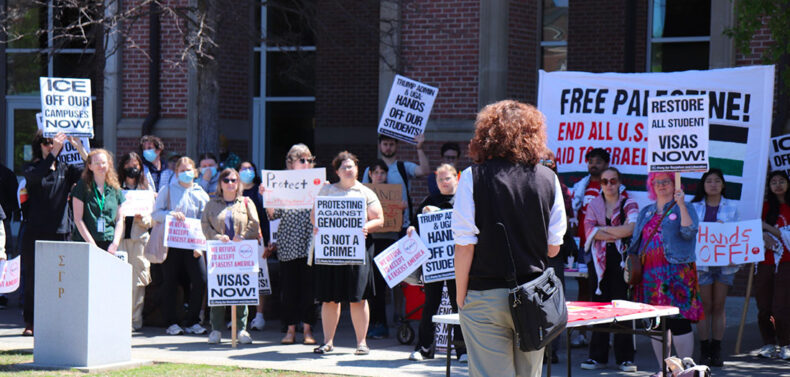In March, Keegan Brooks woke up to an email from his boss informing him that his position as a lab tech no longer existed because the National Park Service had terminated a contract with UGA.
Brooks found a new job, but others have not been so lucky. Tens of thousands of federal employees have lost their jobs, alongside an untold number of graduate and post-doc students conducting research at universities like UGA. The impact of federal cuts in a government town like Athens is far-reaching. However, with university administrators tight-lipped, a presidential administration prone to changing course at any time and courthouses flooded with lawsuits, a comprehensive picture is hard to come by.
“Federal agencies like the National Institutes of Health, the National Science Foundation and the Department of Education are not just bureaucratic institutions. They are lifelines for scientific progress, social equality and the future of our country. The research they fund impacts everything from health care advancements to clinical trials to environmental protection and everything in between, including the development of new technologies and helping us understand society’s most pressing issues,” Brooks said at a recent United Campus Workers of Georgia rally. “But instead of supporting these critical functions, our presidential administration is slashing their budgets and cutting vital funding our community relies on.”
About 50 UGA workers and supporters gathered at the Arch that day to oppose cuts by the Department of Government Efficiency, or DOGE—an unofficial federal agency named for a 2010s internet meme and leader Elon Musk’s brand of cryptocurrency. DOGE claims to have slashed more than $150 billion from the federal budget since President Donald Trump took office Jan. 20, much of it in the form of federal grants perceived to be related to climate change or diversity, equity and inclusion (DEI).
In February, Sen. Ted Cruz (R-TX) released a list of “woke” federal grants, including about 90 awarded to the University of Georgia totaling $122 million. The Senate Commerce, Science and Transportation Committee, which Cruz chairs, found the grants by searching for keywords like “inclusion,” “gender identity,” “system racism” and “social justice.” It’s unclear how many of those grants were frozen or cut. According to the Red & Black student newspaper, at least nine federal research grants awarded to UGA were terminated. Others were cut because the federal government is no longer paying as much for overhead like lab costs.
Among the lost grants that have been confirmed: $15 million for the Feed the Future Peanut Innovation Lab at UGA. The five-year grant was awarded in 2023 by the United States Agency for International Development (USAID), an arm of the State Department that the Trump administration dismantled. The lab works to improve peanut production, nutrition and food safety in developing countries.
Sen. Jon Ossoff (D-GA) sent a letter in March to Secretary of State Marco Rubio requesting an explanation for the cut and asking for it to be restored. Ossoff has not received a response.
“Since 2018, the University of Georgia has hosted the Feed the Future Innovation Lab for Peanut,” Ossoff wrote. “Researchers at this Lab have studied the impacts of different temperatures and rainfall patterns on peanut growth, developed new disease-resistant peanut varieties, and created a risk index tool to help U.S. farmers increase yield potential and improve peanut quality. These projects benefit not only farmers in the United States, but also the U.S. mission to lead in humanitarianism.”
Another program that saw half its budget cut, according to Mayor Kelly Girtz, is housed at the UGA Warnell School of Forestry. It creates coloring books and other educational materials about forests.
In his 2025 State of the University address, delivered in February, President Jere Morehead bragged about UGA’s “flourishing researching pipeline” and status as a top research institution that received a record $628 million in research and development grants last year. That figure includes grants from the National Science Foundation, Department of Defense, National Institutes of Health “and numerous other sources.”
Nevertheless, the university has been silent on cuts to federal grants awarded to UGA researchers. The UGA Marketing and Communications Department did not respond to Flagpole’s inquiries about lost or cut grants, nor its “diversity, equity and inclusion” policies, which have also come under fire from the Trump administration. In addition, Morehead was not among the more than 300 campus leaders who signed a letter from the American Association of Colleges and Universities opposing the Trump administration’s “unprecedented government overreach and political interference” and calling for “constructive engagement.”
Last week the AACU, other higher education groups and 13 research universities—UGA not among them—filed a lawsuit seeking to stop the National Science Foundation from cutting its reimbursement rate for “groundbreaking research.”
Other federal cuts are already threatening to reverberate throughout the Athens community. Last week, local AmeriCorps volunteers were placed on administrative leave and told they could not serve in their roles effective immediately, potentially affecting several programs that feed hungry Athenians with produce grown on campus.
UGArden Director Ty Brooks said he relies on two full-time AmeriCorps VISTA members and four AmeriCorps Community Food Fellows to help run the farm and move produce to nonprofit partners like Campus Kitchen that distribute it. The food fellows program, run through UGA’s Office of Service Learning, also lost 23 people serving with local organizations like UGArden, the Athens Community Council on Aging (Meals on Wheels), Our Daily Bread (a downtown soup kitchen) and Concrete Jungle (an Atlanta-based group that forages, collects and processes fruit).
One of the positions lost includes UGArden volunteer coordinator Allie Johnston. As volunteer coordinator, Johnston helped lead field trips and worked with the community to schedule and organize volunteers. Most of those activities will stop immediately, Brooks said. “We will probably be—at least, temporarily—shutting down our tours,” he said. Students and community members who want to volunteer for harvest days will still be able to come, but all other volunteer opportunities will be canceled, for now, Brooks said.
“The farm is incredibly reliant on the labor of volunteers,” Brooks said. In 2024, UGArden hosted 834 tour participants and led 719 volunteers through useful farm work. Those volunteers helped plant, water, weed, harvest and distribute the nearly 20,000 pounds of food donated to hungry families and nonprofits who help feed the Athens community.
Besides a connection to UGArden and the work, Johnston wanted to stay to help pay down her student debt. Working in AmeriCorps earns a small stipend, paid at the end of a year, or an educational award of about $7,000 in student loan forgiveness. “That was a big appeal for me,” Johnston said.
Some discontinued program participants were told they could earn a pro-rated stipend or educational award as long as they’d completed 15% of their service. Johnston’s educational award appears to be contingent on completing her final four months of service by applying and scoring one of the remaining (not yet slashed) AmeriCorps positions. She would have completed her second year of service in August. “All of this is incredibly infuriating,” she said.
Erin France contributed to this report.
Like what you just read? Support Flagpole by making a donation today. Every dollar you give helps fund our ongoing mission to provide Athens with quality, independent journalism.









